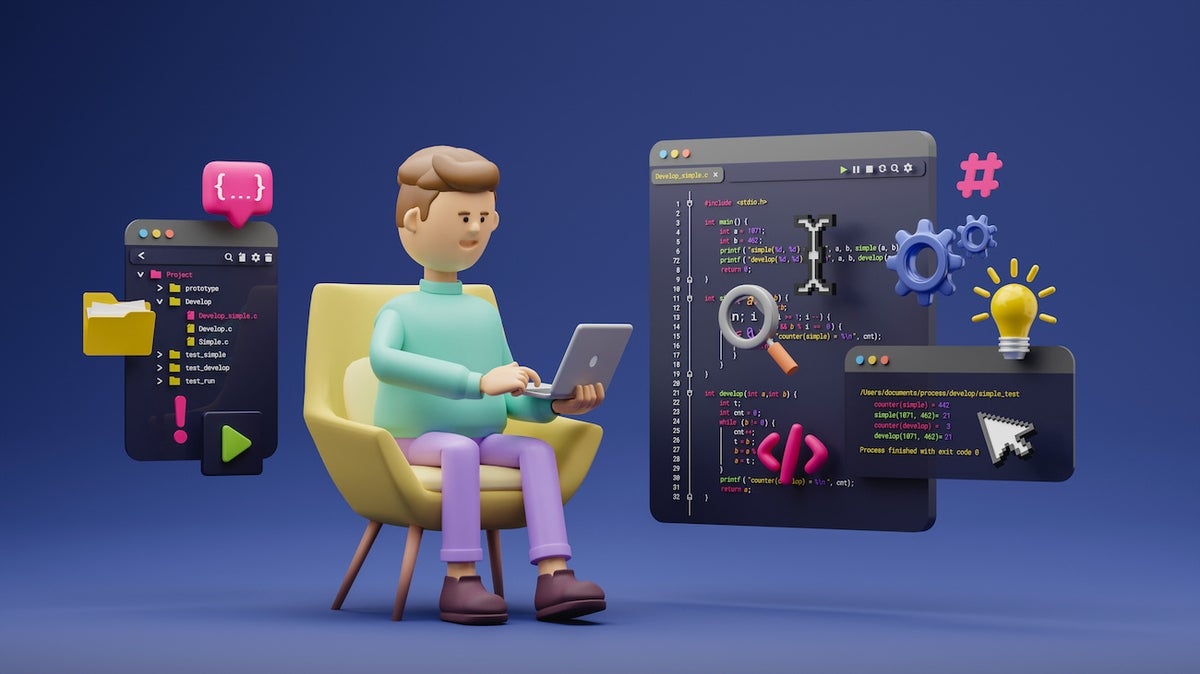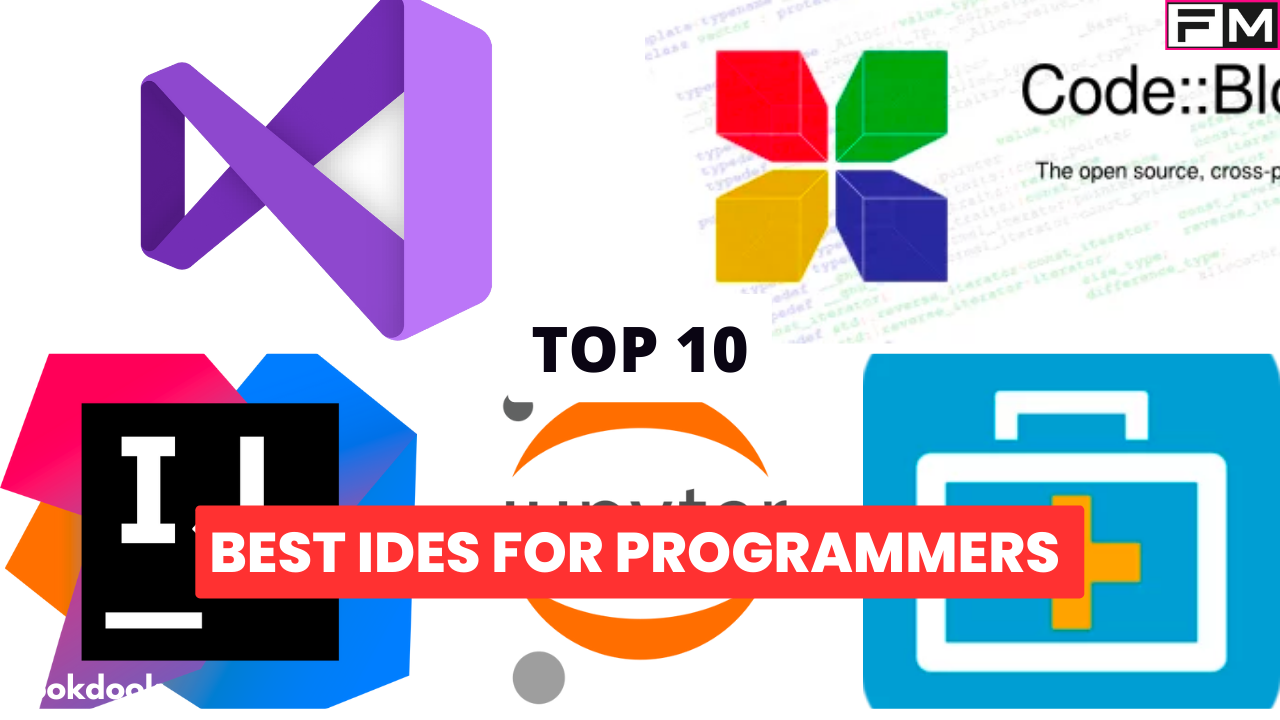Build A Info About Do Programmers Use IDEs

The 12 Best IDEs For Programming
Do Programmers Use IDEs? Unveiling the Developer's Best Friend
1. The Short Answer
Okay, let's get straight to the point: Do programmers use IDEs? The resounding answer is a big, enthusiastic YES! Think of an IDE (Integrated Development Environment) as a programmer's Swiss Army knife. It's not just a text editor; it's a powerful suite of tools designed to make coding easier, faster, and, dare I say, even a little bit more enjoyable. Imagine trying to build a house with just a hammer and some nails versus having a whole toolbox at your disposal. That's the difference an IDE makes.
But why are IDEs so vital? Well, beyond the basic text editing, they offer a treasure trove of features that significantly boost a programmer's productivity. Features like syntax highlighting, which color-codes your code to make it easier to read and understand, and intelligent code completion, which suggests code snippets as you type, saving you tons of time and preventing typos. And who hasn't made a typo that took hours to debug? I know I have!
Seriously, try coding without an IDE for a while, then switch back. It's like going from riding a bike with training wheels to suddenly flying a jetpack. You'll wonder how you ever managed without it. So, yes, programmers absolutely rely on IDEs to streamline their workflow and write better code.
There are many different IDEs for different programming languages, and each has their strengths and weaknesses. Some popular examples include Visual Studio Code (VS Code), IntelliJ IDEA, Eclipse, and Xcode. We'll dive into some of those later. The key is finding one that fits your programming style and the language you're using. It's about finding your coding jetpack.

Top 10 IDEs For Programmers Programmer, Learn Programming, Machine
What Makes an IDE So Darn Useful, Anyway?
2. Features That Make Life Easier
So, what exactly is inside that programmer's Swiss Army knife? Let's take a closer look at some of the key features that make IDEs so indispensable.
First, there's the aforementioned syntax highlighting. This is more than just making your code look pretty. It helps you quickly spot errors, like a missing parenthesis or a misspelled keyword. It's like having a friendly, color-coded guide constantly pointing out potential problems before they even become problems.
Then there's code completion (also known as "IntelliSense"). This feature predicts what you're going to type and suggests possible completions. This is especially helpful when working with large APIs or libraries, where remembering every function name and parameter can be a real challenge. It not only saves you typing but also reduces the chance of making mistakes. Think of it as auto-correct, but for code, and without the embarrassing misinterpretations.
And don't forget the debugger. Debugging is the art of finding and fixing errors in your code, and it can be a real pain. An IDE's debugger allows you to step through your code line by line, inspect variables, and see exactly what's happening at each stage. This makes it much easier to track down bugs and squash them. It's like being a code detective, armed with the tools to solve the mystery of why your program isn't working.
Finally, most IDEs also offer integration with version control systems like Git. This makes it easy to track changes to your code, collaborate with other developers, and revert to previous versions if necessary. It's like having a time machine for your code, allowing you to undo mistakes and experiment with new ideas without fear of breaking anything. And trust me, you will break things at some point. We all do!

Top 10 Best IDEs For Programmers In 2023
Popular IDEs for Different Languages
3. A World of Choices
The programming world is a diverse place, and there's an IDE for just about every language and coding style. Let's explore some of the most popular options.
Visual Studio Code (VS Code): This is a free, open-source IDE that's incredibly popular due to its versatility and extensive library of extensions. It supports a wide range of languages, including JavaScript, Python, C++, and many more. VS Code is known for its lightweight performance and its powerful features, making it a great choice for both beginners and experienced developers.
IntelliJ IDEA: This is a commercial IDE that's known for its intelligent code assistance and its support for Java, Kotlin, and other JVM languages. IntelliJ IDEA offers a wide range of features, including code completion, refactoring tools, and debugging capabilities. It's a favorite among professional Java developers.
Eclipse: This is another popular open-source IDE that's often used for Java development. Eclipse is highly customizable and offers a wide range of plugins and extensions. It's a powerful tool that's well-suited for large and complex projects.
Xcode: This is Apple's IDE for developing applications for macOS, iOS, watchOS, and tvOS. Xcode includes a complete set of tools for designing, coding, and debugging applications. It's a must-have for anyone who wants to develop software for Apple devices.
The best IDE for you will depend on your specific needs and preferences. Don't be afraid to try out a few different IDEs to see which one you like the best. Most offer free trials, and VS Code is free forever. Happy coding!

IDEs vs. Text Editors
4. Beyond the Basics
You might be thinking, "Okay, IDEs sound fancy, but can't I just use a regular text editor like Notepad or Sublime Text?" Well, technically, yes, you can. But it's like trying to build a skyscraper with a hammer and some nails. It's going to be a lot harder and a lot less efficient.
The key difference between an IDE and a text editor is the level of integration and the range of features offered. A text editor is primarily designed for editing text files, including code. It might offer some basic features like syntax highlighting, but it typically lacks the advanced features of an IDE, such as code completion, debugging, and version control integration.
Think of a text editor as a blank canvas. You have complete freedom to write whatever you want, but you're responsible for everything yourself. An IDE, on the other hand, provides a structured environment with tools and features to guide you and help you avoid mistakes. It's like having an experienced architect and a team of builders working alongside you.
While text editors can be useful for simple coding tasks or for quick edits, IDEs are essential for larger and more complex projects. They provide the tools and features you need to write code efficiently, debug effectively, and collaborate with other developers. So, while you can code without an IDE, it's like choosing to walk across the country instead of flying. You'll get there eventually, but it's going to take a lot longer and be a lot more painful.

IDEs ENGI 1020
Choosing the Right IDE for You
5. Finding Your Perfect Match
With so many IDEs to choose from, how do you decide which one is right for you? Here are a few factors to consider.
The programming language you're using: Some IDEs are specifically designed for certain languages, such as Java or C++. If you're primarily working with one language, it's often a good idea to choose an IDE that's optimized for that language. For example, if you are a heavy python user, Pycharm might be your perfect match.
Your experience level: Some IDEs are more beginner-friendly than others. If you're just starting out, you might want to choose an IDE that's easy to learn and use. VS Code is generally considered a good choice for beginners due to its intuitive interface and extensive documentation.
The size and complexity of your projects: For small projects, a lightweight IDE or even a text editor might be sufficient. But for larger and more complex projects, you'll need an IDE that offers a wide range of features and can handle the increased workload. IntelliJ IDEA and Eclipse are often used for large enterprise projects.
Your personal preferences: Ultimately, the best IDE for you is the one that you feel most comfortable using. Don't be afraid to try out a few different IDEs and see which one you like the best. Most offer free trials, so you can experiment before committing to a purchase.
Finally, don't be afraid to switch IDEs as your needs change. As you become more experienced, you might find that you need a more powerful IDE or that you prefer a different workflow. The key is to be flexible and to choose the tools that work best for you. And remember, there's no shame in admitting that you were wrong about your IDE choice. We've all been there!

FAQs About Programmers and IDEs
6. Your Burning Questions Answered
Still have some questions about programmers and IDEs? Let's tackle some of the most frequently asked questions.
Q: Do all programmers use IDEs?A: While it's possible to code without an IDE, the vast majority of professional programmers rely on them. The productivity benefits and advanced features are simply too good to pass up. Think of it like asking if all carpenters use power tools. They could use hand tools, but why would they?
Q: Are IDEs only for experienced programmers?A: Not at all! In fact, IDEs can be especially helpful for beginners. Features like syntax highlighting and code completion can make it easier to learn the basics of programming. Plus, many IDEs have built-in tutorials and documentation to help you get started.
Q: Is there a "best" IDE?A: There's no single "best" IDE for everyone. The ideal choice depends on your programming language, your experience level, and your personal preferences. It's like asking what the best flavor of ice cream is. It's all subjective!
Q: Do IDEs cost money?A: Some IDEs are free and open-source, while others are commercial products that require a subscription or license. Visual Studio Code and Eclipse are examples of free IDEs, while IntelliJ IDEA is a commercial IDE. Many commercial IDEs offer free trials, so you can try them out before you buy.